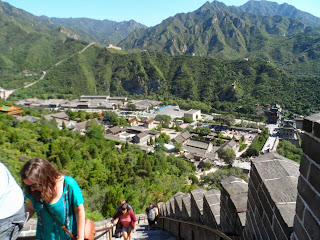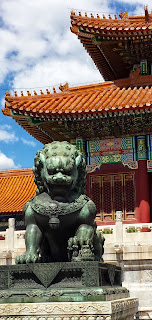Beijing
(29/08/13-01/09/13)
Population: 20.18
million.
Famed For:
Being the Capital of China.
不到长城非好汉
(bú dào Chángchéng fēi
hǎohàn)
'He who has never been to the Great
Wall is not a true man.'
Chinese Proverb
The
Great Wall of China is literally breath-taking. Undulating across the
land, it dips and curves to follow the contours of the hills it sits
on and in the morning light it emerges from the densely forested
slopes like a great grey snake or the tail of a dragon, with it's
ridged scaling turrets and winding pathways.

 In
some places the ascent becomes so steep and the steps so high and
narrow that the handrail is the only thing left to cling onto. It
stains the tourists' palms rust red and tests the muscles in your
legs and the steel of your nerves. At some points the path becomes
too constrictive to stop without blocking the way, so, with lungs heaving,
you push onwards up towards the small fort that marks a stopping
point.
In
some places the ascent becomes so steep and the steps so high and
narrow that the handrail is the only thing left to cling onto. It
stains the tourists' palms rust red and tests the muscles in your
legs and the steel of your nerves. At some points the path becomes
too constrictive to stop without blocking the way, so, with lungs heaving,
you push onwards up towards the small fort that marks a stopping
point.But the view. Everything is worth it for the view.
It
makes you feel...small.
Walking one of the new Wonders of the World,
on steps which were two thousand years in the making, built by slaves
and peasants and soldiers now long gone, for one of the world's
oldest civilisations and here you are, one person casually standing
on so much history.
The
sense of perspective is both refreshing and terrifying. It's also
coloured with a huge sense of achievement, because despite being one
person you have in some way conquered the Wall, and followed in the
footsteps of thousands of people before you.
You are now part of the
history.
I stop
to read some of the graffiti that has been scrawled along the Wall by
previous travellers, hoping for some words of wisdom, some sense of
profundity.
Eva
+ Carl woz here - '99
I can
only assume they too were overwhelmed by the sense of history.
Meanwhile, in the
heat of a cloudless blue sky day, the roof of the Forbidden City
gleams gold and bronze and the sunlight picks out the small dragons
that rest on the edges of the tiles. The white stone floors are
impossibly bright against the sunburn-red walls and everywhere there
is a sense of both grandeur and space. It's very different to a
British Palace or a UK Stately Home, whose buildings are full of
carpets and paintings, antiques and statues and so much clutter.
 The
Forbidden City exudes minimalism. The many Halls feature gleaming
floors, a golden throne and perhaps a few vases as tall and wide as a
grown man. The rest is space (the artefacts having mostly been moved
to special museum rooms to the sides of the palace complex).
The
Forbidden City exudes minimalism. The many Halls feature gleaming
floors, a golden throne and perhaps a few vases as tall and wide as a
grown man. The rest is space (the artefacts having mostly been moved
to special museum rooms to the sides of the palace complex).
It means
you have to use your imagination to travel back to 1420 A.D (when the
Palace was finished) to imagine the smell of incense, food, the
perfume of flowers thick in the air, servants running to and fro. The
sound of courtiers trying to obtain favour, the echo of gongs, music
from lutes, harps and drums. The Emperor seated on his throne,
conducting affairs of state. The Empress sipping steaming fragrant
tea. The concubines, secluded in their rooms, plotting their next
political move.
Admittedly,
this is quite difficult when half a dozen people try and take your
photo at the same time.
To
really gain a sense of just how big the Palace complex is (and to
escape from the crowds) we took the short walk up to the top of
Jingshan Park, directly opposite the Forbidden City. And once at the
top the whole of Beijing unfurls like a large gilded flower opening
at dawn, the hilltop providing a 360 degree view of the capital. The
Forbidden City gleams and suddenly you can understand why they call
the Palace a City because anything less would be ludicrous. It simply
is that big.
Like
the sprawling mass of the Great Wall, the Forbidden City seems larger
than life, an impressive feat of planning, building and engineering.
It's as though everything in Beijing is seen through a
fairground hall of mirrors- everything is bigger, stranger and more
exaggerated and it's been deliberately built like that. It almost
seems like a type of madness, this obsession with size and grandeur.
But
when you live in a country that contains one seventh of the world's
total population, why do anything small?






No comments:
Post a Comment